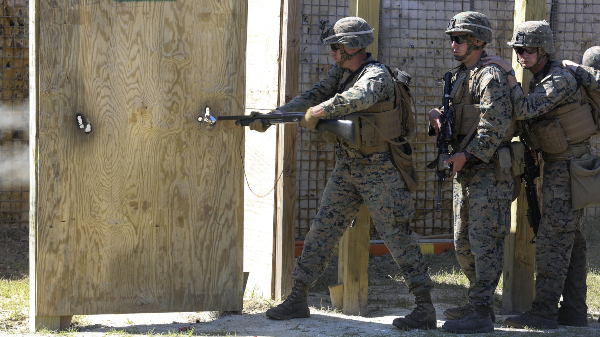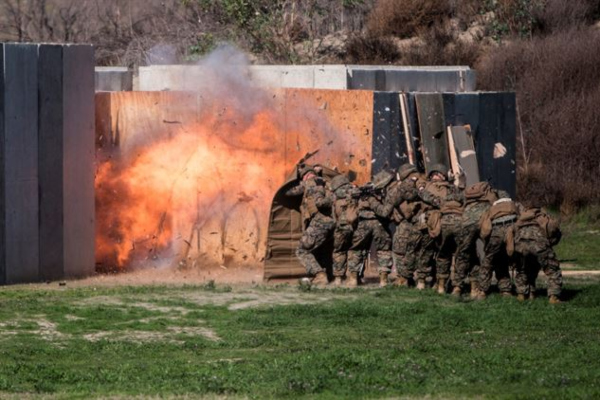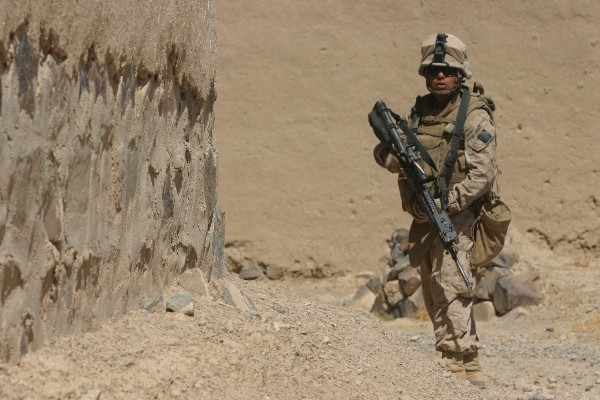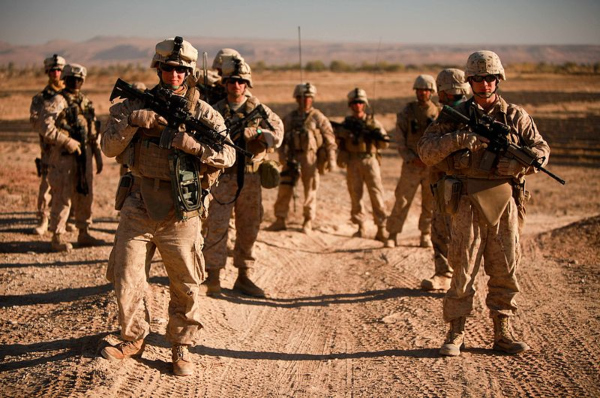A Marine Combat Engineer is the unsung hero of the military branch.
Combat Engineers work hard to build and repair damaged infrastructure.
They maintain buildings, roads, and power supplies for the Marine Corps.
However, the job role is also considered dangerous as engineers may face combat while making repairs or additions.
Learn more about what it takes to become a Marine Combat Engineer (MOS 1371).
Related Article – Marine Engineer Equipment Operator (MOS 1345): Career Details
Education, Qualifications, and Training

The Marine Corps classifies its jobs as Military Occupational Specialties (MOS).
Every USMC MOS has requirements to qualify for the military job.
Therefore, if you are interested in becoming a Marine Combat Engineer (MOS 1371) you need to understand the qualifications and training:
Education
The Marine Corps is like other military branches in that it expects you to complete high school with a diploma.
If you did not finish high school, the military branch usually accepts a GED equivalent.
However, your chances of getting accepted without one of the above are slim so make sure you make education a priority.
Additionally, every military branch requires you to complete ASVAB testing.
The Armed Services Vocational Aptitude Battery (ASVAB) is a series of examinations comparable to a test you would take in high school.
It determines your strengths and weaknesses and therefore finds the Military Occupational Specialties (MOS) that suit your skillset.
You need to score at least Mechanical Maintenance (MM): 95 on the ASVAB to qualify for Marine Combat Engineer (MOS 1371).
The Mechanical Maintenance portion of the exam comprises the following sections:
- General Science (GS)
- Auto and Shop Information (AS)
- Mathematics Knowledge (MK)
- Mechanical Comprehension (MC)
You can learn more about the ASVAB and how to prepare for testing by speaking to a local USMC recruiter.
Related Article – Marine Corps Bonus List For Enlistment and Retention
Qualifications
There are basic and advanced qualifications for Marine Combat Engineer (MOS 1371).
First, the basic requirements apply to every new recruit of the Marine Corps regardless of Miltary Occupational Specialty:
- A citizen of the United States.
- Between the ages of 17-28.
- High school diploma or GED equivalent.
- Meet the physical fitness standards of the Marine Corps.
Along with the physical examination, new recruits also need to pass the medical exam which takes place at the Military Entrance Processing Station (MEPS).
There is no security clearance required for MOS 1371, unlike some Military Occupational Specialties.
You will need to have normal color vision for this MOS, with no color blindness.
Secondly, you need to make sure that you qualify for military service by meeting height and weight as well as grooming standards.
Marines also must remain compliant with the tattoo policy of the branch.
Training
Every new recruit, regardless of MOS, begins their journey with boot camp.
Basic Combat Training takes place at one of two locations:
- Marine Corps Recruit Depot Parris Island (South Carolina)
- Marine Corps Recruit Depot San Diego (California)
The grueling training program lasts 13 weeks and confirms that you have what it takes to serve the USMC.
Furthermore, a prospective Marine Combat Engineer must complete specialized training for the MOS.
The Basic Combat Engineer course is available through the Marine Corps Engineer School.
The training grounds are out of Camp Lejeune in North Carolina.
Moreover, any Marine with the rank of gunnery sergeant (E-7) or higher must complete the Engineer Operations Chief Course.
Lastly, the Marine Corps also recommends the following courses for MOS 1371 as they progress in rank and experience.
- Intermediate MAGTF Logistics Operations Course (IMLOC)
- Tactical MAGTF Integration Course (TMIC)
Once a Marine is fully qualified, he or she will receive an assignment to a combat engineer battalion, support battalion, or Marine wing support squadron.
Related Article – Marine Corps LAAD Gunner (MOS 7212): Career Details
What does a Marine Combat Engineer Do?

A Marine Combat Engineer (MOS 1371) has a very important yet thankless role within the military branch.
Combat Engineers build, repair, and maintain buildings, roads, and power supplies.
The kicker is that Combat Engineers (MOS 1371) are often under fire while they make repairs.
Therefore, the Military Occupational Specialty (MOS) falls under the role of combat since you’ll likely encounter dangerous situations.
Marine Combat Engineers have one of the most crucial jobs in the USMC because they help keep the critical infrastructure intact.
USMC Engineers are often on the front line of any offensive action against enemy troops.
Combat Engineers are the first to respond and remedy the situation when the battalion reaches a place they cannot access or need repairing,
For this reason, Combat Engineers are accustomed to using explosives for construction and demolition projects.
Marine MOS 1371 also use heavy machinery like the Assault Breacher Vehicle to clear minefields.
Combat Engineers work within the Marine Expeditionary Unit (MEU).
They support ground forces by removing obstacles, building causeways, and erecting bunkers.
Finally, MOS 1371 also learn carpentry skills and other trades so they can work on a wide range of construction projects.
Related Article – Navy Seabees Career Details
Marine Corps Combat Engineer (MOS 1371) Job Duties
According to the Marine Corps, these are the official duties of MOS 1371:
- Conduct engineer reconnaissance
- Emplace obstacle systems
- Conduct breaching operations that include explosive hazards
- Conduct mine/countermine operations
- Employ demolitions and military explosives
- Provide urban reaching operations
- Conduct route clearing
- Provide assault bridging and tactical bridging
- Construct and maintain roads, trails, and bridges
- Construct expedient roads and airfield/landing zones
- Design and construct survivable positions
- Perform expedient vertical and horizontal construction
- Design, construct and maintain base camps/forward operating bases
What does a Marine Combat Engineer make?

A Marine Combat Engineer (MOS 1371) makes the same monthly income as other Marines in the same rank.
Consequently, pay in the Marine Corps is dictated by military rank and years of service:
| Insignia | Pay Grade | Rank | Abbreviation | 2023 Minimum Monthly Pay |
|---|---|---|---|---|
| E-1 +4 months | Private | Pvt | $1,917.60 | |
| E-2 | Private First Class | PFC | $2,149.20 | |
| E-3 | Lance Corporal | LCpl | $2,259.90 | |
| E-4 | Corporal | Cpl | $2,503.50 | |
| E-5 | Sergeant | Sgt | $2,730.30 | |
| E-6 | Staff Sergeant | SSgt | $2,980.50 | |
| E-7 | Gunnery Sergeant | GySgt | $3,3445.80 | |
| E-8 | Master Sergeant | MSgt | $4,957.20 | |
| E-8 | First Sergeant | 1stSgt | $4,957.20 | |
| E-9 | Master Gunnery Sergeant | MGySgt | $6,055.50 | |
| E-9 | Sergeant Major | SgtMaj | $6,055.50 | |
| E-9 | Sergeant Major Of The Marine Corps | SgtMaj | $6,055.50 |
Job Reviews
You can find out more about what it’s like to serve the country as a Marine Combat Engineer (MOS 1371) by reading online job reviews.
Job sites like Indeed.com have several reviews from former MOS 1371:

Expect a productive yet challenging work environment:

The Marine Corps can also help you progress your education or future after leaving the military branch:

All in all, the military instills qualities and characteristics that are invaluable to anything you decide to do in life after your military career comes to a conclusion:

Related Article – Marine Corps UAS Operator (MOS 7314): 2023 Career Details
Civilian Job Opportunities
There are many different civilian occupations you may pursue after finishing your military career.
A Marine Combat Engineer is in an excellent position of success after leaving the branch.
Combat Engineers are incredibly knowledgeable and skilled in several areas of construction.
Therefore, many continue to work in the construction trade as carpenters, concrete finishers, or masons.
The high stakes and hazardous work environment of a Combat Engineer teach you leadership skills and how to work under intense pressure.
Some decide to start their own construction companies or work for the military as private contractors.
Related Article: 10 Best Marine Corps Jobs For Civilian Life
Summary
A Marine Combat Engineer (MOS 1371) is critical to daily operations.
Combat Engineers make quick repairs and maintain infrastructure while facing an enemy force.
They work in a high-paced and intense work environment where they may see combat while making critical repairs.
Additionally, Combat Engineers work on a variety of construction projects and have many different skills.
They also handle explosives and conduct demolition exercises to clear pathways for fellow ground troops.
Resources:
- https://www.cool.navy.mil/usmc/enlisted/1371.htm
- https://www.indeed.com/cmp/U.S.-Marine-Corps/reviews?fjobtitle=Combat+Engineer
- 5 Best Jobs for Female Marines - June 20, 2024
- 10 Best Marine Corps Recruiting Videos of All Time - June 20, 2024
- Marine Corps Requirements - June 20, 2024
General FAQ
What does a combat engineer do in the Marines?
USMC Combat Engineers have a number of responsibilities and duties. For starters, they are the people that are tasked with building and maintaining bridges, roads, power stations, and barracks. Click Here to learn more about what they do.
How long is MOS 1371 school?
USMC Combat Engineer school a median time of 3 months in duration, and is conducted exclusively at Camp Lejeune, North Carolina. The reason why we list it in median time is that there are several different courses available. Depending on which training qualification you're going after, the courses can be as short as 2 months, to as long as 8 months.
Do USMC combat engineers see combat?
It is very possible for those in MOS 1371 to see combat, depending on the circumstances. If you're deployed to a war zone, there's a very good chance that you will be involved in combat operations.
Where are Marine combat engineers stationed?
USMC combat engineers are stationed all over the world. Your duty station will be dependent on a wide variety of factors, the most important one being where combat engineers are currently needed the most. See a list of Marine Corps bases in the US here.

